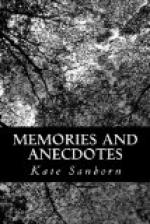There were many questions and decided differences of opinion. At last one lady said: “Please give us examples of men who possess genius rather than talent.” As she spoke, the door opened, and in walked Mrs. Edmund Clarence Stedman, wife of the poet, and with her a most distinguished-looking woman, Mrs. William Whitney. I was a little embarrassed, but replied sweetly, “Sheets and Kelley,” meaning “Keats and Shelley.” Then followed a wild laugh in which I joined.
Dr. John Lord once told me he had a similar shock. He spoke of “Westford and Oxminster,” instead of “Oxford and Westminster,” and never again could he get it correctly, try as he would. Neither his twist nor mine was quite as bad as that of the speaker who said: “I feel within me a half-warmed fish; I mean a half-formed wish.”
All genius [continued Lady Henrietta], whether it is artistic, or literary, or spiritual, is something given from outside. I once heard genius described as knowing by intuition what other people know by experience.
Something, or, I should say, somebody, for it involves intelligence and knowledge, tells you these things, and you just can’t help expressing them in your own particular way, with brush, or pen, or voice, whatever your individual instrument may be.
From Patricia by Hon. Mrs. ROBERT HAMILTON.
It was a pleasure to see that my theory of Genius was the same as Lady Henrietta’s in that charming book Patricia. I have enough collected on that subject to give me shivers of amazement as I read the mass of testimony. The mystery of Inspiration has always enthralled me.
I was invited to so many evenings “at home,” dinners and luncheons, that I decided to reciprocate and be surely at home on Tuesday evenings. These affairs were very informal and exceedingly enjoyable. There were many who gladly entertained us by their accomplishments. Champney the artist, sent after blackboard and chalk, and did wonderfully clever things. Some one described a stiff and stupid reception where everyone seemed to have left themselves at home. Those who came to me brought their best. Mrs. Barnard, wife of President Barnard of Columbia College, urged me to give three lectures in her parlour. I could not find the time, but her house was always open to me. To know Mr. Barnard was a great privilege. When called to Columbia, it was apparently dying from starvation for new ideas, and stagnant from being too conservative and deep in set grooves. His plans waked up the sleepers and brought constant improvements. Though almost entirely deaf, he was never morose or depressed, but always cheerful and courageous. I used to dine with them often. Tubes from each guest extended into one through which he could hear quite well. He delighted in discussion of current events, historical matters, politics of the day, and was apparently well informed on every question.




